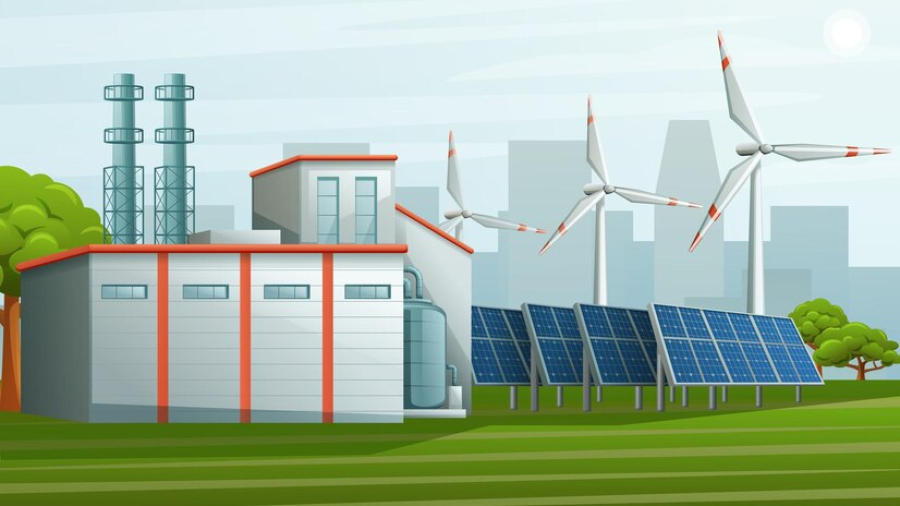Introduction
As the world grapples with the urgent need for sustainable energy solutions, industrial solar plants have emerged as a pivotal force in the renewable energy landscape. These large-scale installations harness the sun’s power to generate electricity, offering a plethora of benefits that align with global efforts to combat climate change and promote energy independence. This blog explores why industrial solar plants are not just a trend but a fundamental part of the future of renewable energy.
Understanding Industrial Solar Plant
Industrial Solar Plant is large-scale solar energy systems designed to produce electricity for commercial and industrial applications. They utilize photovoltaic (PV) panels or concentrated solar power (CSP) systems to convert sunlight into usable energy. These installations can range from megawatt-sized facilities serving large corporations to vast solar farms supplying power to the grid. The significant scale of these plants enables them to produce large amounts of energy, making them a practical solution for meeting the growing energy demands of industries.
Key Benefits of Industrial Solar Plant
1. Sustainability and Environmental Impact
One of the most compelling reasons for the rise of industrial solar plant is their contribution to sustainability. By utilizing a renewable energy source, these plants help reduce greenhouse gas emissions and reliance on fossil fuels. The electricity generated from solar power significantly lowers the carbon footprint of industrial operations, helping businesses meet their sustainability targets and comply with increasingly stringent environmental regulations.
2. Cost Savings and Economic Benefits
While the initial investment in an industrial solar plant can be substantial, the long-term cost savings are significant. Once operational, solar plants have low ongoing operational and maintenance costs compared to traditional energy sources. The declining cost of solar technology, combined with various incentives and tax credits, has made solar energy an economically viable option for industries. Moreover, the ability to generate power on-site can protect businesses from fluctuating energy prices and reduce their overall energy expenditures.
3. Energy Independence and Security
Industrial solar plants enhance energy independence by reducing reliance on external energy sources. In an era where energy security is paramount, these installations empower industries to produce their electricity, mitigating the risks associated with energy supply disruptions. By harnessing local solar resources, businesses can create a more resilient energy system, contributing to a stable and secure energy future.
4. Job Creation and Economic Growth
The expansion of industrial solar plants contributes to job creation and economic growth. The construction, operation, and maintenance of these facilities generate a range of employment opportunities, from engineering and project management to installation and technical support. Additionally, the growth of the solar industry stimulates local economies by creating demand for related services and products, fostering innovation and entrepreneurship.
Technological Advancements in Solar Energy
Advancements in solar technology have significantly enhanced the efficiency and viability of industrial solar plants. Innovations in photovoltaic materials, energy storage systems, and grid integration have made solar energy more accessible and effective. For instance, energy storage solutions allow industrial plants to store excess energy generated during the day for use during peak demand periods or at night. To optimize energy utilization and ensuring a reliable power supply.
Challenges and Considerations
While the benefits of industrial solar plants are substantial, several challenges must be addressed to ensure their widespread adoption:
- Land Use and Site Selection
The large land requirements of industrial solar plants can lead to challenges in site selection, particularly in densely populated or ecologically sensitive areas. Strategic planning and consideration of land use are essential to minimize environmental impacts and address community concerns. - Regulatory and Policy Framework
A supportive regulatory framework is crucial for the successful implementation of industrial solar plants. Policies that promote renewable energy adoption, streamline permitting processes, and provide financial incentives can facilitate the growth of the solar industry. - Initial Capital Investment
Despite the long-term cost savings, the initial capital investment required for industrial solar plants can be a barrier for some businesses. Innovative financing solutions, such as power purchase agreements (PPAs) and solar leases. It can help mitigate this challenge and encourage more companies to invest in solar energy.
The Role of Industrial Solar Plants in Energy Transition
As the global energy landscape undergoes a significant transition towards renewables, industrial solar plants play a crucial role in shaping this future. Their scalability, efficiency, and environmental benefits make them an attractive option for industries seeking to align their operations with sustainable practices. Moreover, as technological advancements continue to improve the efficiency and affordability of solar energy. The potential for industrial solar plants to meet the energy needs of various sectors will only grow.
Conclusion
Industrial solar plants represent a transformative solution in the quest for sustainable energy. By providing clean, reliable, and cost-effective electricity.They empower industries to embrace renewable energy and contribute to a more sustainable future. As the world shifts away from fossil fuels, the growth of industrial solar plants will be instrumental in driving the renewable energy revolution. By investing in these installations, businesses can not only reduce their environmental impact but also secure their energy future. Creating a win-win scenario for both the economy and the planet. Embracing industrial solar plants is not just a trend. It is a necessary step towards a sustainable energy landscape for generations to come.
Read More: How to Select the Best Solar Panel Company in Gujarat?

